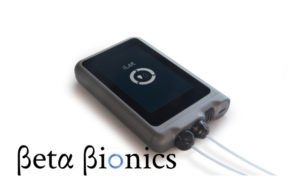
Beta Bionics’ iLet bionic pancreas offers insulin therapy without some of the hurdles associated with treating diabetes.
Users of insulin pumps may be used to a certain regimen associated with managing their diabetes. That can include carbohydrate counting, setting basal rates and more.
Beta Bionics has set out to change that. With the Concord, Massachusetts-based company’s iLet bionic pancreas, the user inputs just one number: their body weight.
The company designed the pocket-sized, wearable, investigational iLet device to autonomously dose insulin. Worn like an insulin pump, iLet users only enter body weight to initialize therapy without the need for insulin regimen parameters. The company designed the device to then automatically titrate and infuse insulin without requiring the counting of carbs, the settings of certain rates and factors and more.
“It’s very qualitative, not quantitative,” Beta Bionics interim CEO and board member Martha Aronson told Drug Delivery Business News. “This cognitive burden — the amount of math you have to do every day if you’re a person with type one diabetes — is extraordinary. Our goal is to take away that cognitive burden for people who live with type one diabetes.”
Data backs the iLet
Results of an investigator-initiated study, presented at the International Conference on Advanced Technologies & Treatments for Diabetes (ATTD) in Barcelona, came from an at-home evaluation of 440 adults and children aged six years and older with type 1 diabetes. The study tested the safety and efficacy of the iLet bionic pancreas relative to a standard of care control group (split approximately into thirds between automated insulin delivery, insulin pump therapy with continuous glucose monitoring and multiple daily injections with CGM) over a 13-week study period. The study used Dexcom’s G6 CGM.
Primary analysis of the study, which met all key endpoints, compared the iLet using Humalog or Novolog against the standard of care in 326 adults in children. The remaining 114 adult participants used iLet with Fiasp. The iLet demonstrated a significant reduction in HbA1c (0.5%) compared to those using the standard of care. There was no increased risk of hypoglycemia and time in range increased by an average of 2.6 hours more per day compared to the standard of care.
‘When you take a look at the baseline of where the many of these folks started — and in this trial it was it was lower than it’s been in many other trials — because we had real-world representation, that percent increase or the number of hours increase each day was very significant,” Aronson said.
That real-world representation came through the goal of reaching a broad demographic in the trial, with 74% of participants being White non-Hispanic, 10% Black non-Hispanic, 10% Hispanic or Latino and 6% other or more than one race.
Aronson said that, in terms of diversity and representation, the trial was “the most representative trial that’s ever been performed.”
“The goal of this group when they put together the study design was to have it be as truly representative of the population who lives with type one diabetes as possible,” Aronson said. “I think people feel very good that the investigators accomplished that. I think people are very excited about that.”
Next Steps
The iLet holds FDA breakthrough device designation and Aronson said the company is in the FDA review process right now. She noted that it’s impossible to guess on the timing of potential clearance and Beta Bionics remains focused on the things it can control with eyes on being ready if and when the regulatory nod comes.
Before that happens, the aim is — as Aronson put it — to think about the “80% of people who are not in control.” That entails expanding the market of people using technology to manage their diabetes for those who are willing to relinquish control and those who never had it in the first place.
Aronson compared the concept to a fully autonomous car.
“I’m used to having the control of driving a car,” she said. “So, if tomorrow, they tell me to just jump in a car and tell it where I want to go, that’s going to be a very, very big shift for me, right? But my grandchildren, they probably won’t learn to drive a car— they probably will just jump in an autonomous vehicle because that will be all that they know.
“That’s just another way to think about how we believe our technology will be positioned once it gets into the marketplace.”
As far as further developments beyond the iLet for type 1 diabetes — including for type 2 diabetes or even for automated drug delivery outside of insulin — discussions are ongoing at Beta Bionics. However, Aronson said the focus remains on the task at hand.
‘The company is at a point where we need to get very well prepared to for commercialization of the iLet,” Aronson said. “We’re having to make some tough decisions and we may not be able to do everything immediately but we’re extremely excited about what’s right in front of us right now, which is getting the organization commercially and operationally ready for the day when we hopefully get clearance from the FDA.”

